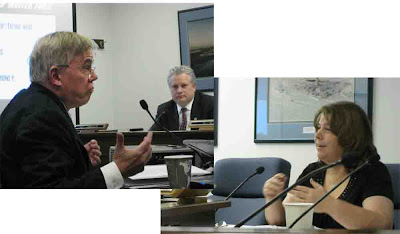The Select Committee on Legislative Ethics is responsible for:A couple of issues they discussed were:
· Helping people understand and comply with the Alaska Legislative Ethics Code,
· Issuing formal advisory opinions interpreting the ethics code,
· Considering complaints alleging violations of the code and
· Maintaining public files of disclosure statements
- An attorney in the legislative legal office had interpreted the laws to mean that when legislators travel on state money for state business, they are NOT allowed to do anything that could be construed as campaigning. The case that brought about this ruling was, if I have my facts straight, about someone who went to a fundraiser or some such overt campaign activity on such a trip. This apparently wasn't a big part of the trip, but it was ruled as a violation of the rules.
Now other legislators are concerned that they cannot do anything - even talk to anyone - in a way that remotely relates to campaigning. Legislative members pointed out that being a legislator was inherently political and with the financial realities of modern day politics, as soon as they take office, they have to start campaigning for the next election. When they speak to constituents, someone could consider that campaigning. Another legislator said that she was not even allowed (they can ask for advisory opinions from the ethics committee if they have doubts) to stop by campaign headquarters on a trip to Anchorage to check on potential candidates for an upcoming election.
Concerns were raised at another committee meeting and before the ethics committee was a proposal to get a second opinion on this. Someone questioned the expense of a second opinion, someone else said for political reasons, it would be advisable. The original attorney said that their office would welcome a second opinion. They voted to get a second opinion.
- Staff from the Information Technology (IT) office were at the meeting because the committee had questions about the feasibility of having executive sessions via teleconferencing. A couple of the rural public members said that getting to meetings could take them three days of travel, which cut into their normal work lives. Another member thought a meeting which might take 20 minutes could cost $50 or $60 in travel costs for all the members. If they could do this by phone or video conference it would speed up the process and save a lot of money.
The IT staff couldn't guarantee complete confidentiality. Using audio conferencing was more likely than video, but even then there were some ways that people could, at least for a short time, could breach security. Plus, you can't tell if the people on the other end of the line have someone else in the room with them. I'm leaving out a lot of the details, but the committee did feel that siince some of the issues they discuss were extremely sensitive, a breach of security was not acceptable. This was put on hold.
I happened to stop in Rep. Max Gruenberg's office when Anchorage Transit Director Jody Karcz stopped in to discuss their budget and proposal they are working on. Ms. Karcz is on the far left and Rep. Gruenberg on the right. The Rep's staff were sitting in on the discussion. Serious cuts have had major impacts on transit in Anchorage including the cancelling of local bus service in the Eagle River area. (Park and Ride busses still operate.) They will experiment, beginning March 1 I believe, with allowing regular passengers to use the Anchor Ride buses (these are normally only for the disabled). This will only be done in the Eagle River area.
Rep. Mike Doogan testified before the House Transportation Committee in support of his bill (HB 257) to ban the use of cell phones - including hands free devices - while driving a car. Here he was in an animated discussion with Rep. Tammie Wilson of Fairbanks who asked questions about other distractions, about pulling over to the side, and other such questions. Rep. Kyle Johansson is looking on in the background. Transportation Committee Chair Peggy Wilson is co-sponsor. She mentioned that her 85 year old mother was hit by a driver using a cell phone and she had to crawl out through the passenger seat and walk over to the other driver who was still talking on her cell phone.




































